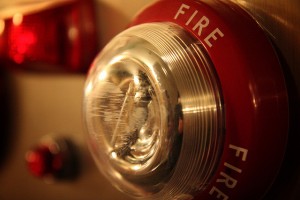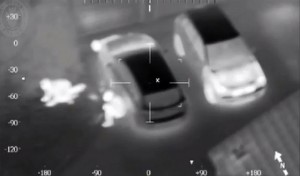 No business is immune to risk or unpredictable circumstances. In an emergency, often times, there’s an influx of panic for those involved. Our dedicated and hardworking emergency responders-firefighters, EMTs, ambulance, and police-are the ones who keep a strong front and are prepared to help us through these tough situations. As a business owner wouldn’t it be great if there was a way to lessen the constant fear of unknown threats to your organization? Fortunately, there is something you can do for your business, your employees, yourself, and the responders. Be prepared and have a plan.
No business is immune to risk or unpredictable circumstances. In an emergency, often times, there’s an influx of panic for those involved. Our dedicated and hardworking emergency responders-firefighters, EMTs, ambulance, and police-are the ones who keep a strong front and are prepared to help us through these tough situations. As a business owner wouldn’t it be great if there was a way to lessen the constant fear of unknown threats to your organization? Fortunately, there is something you can do for your business, your employees, yourself, and the responders. Be prepared and have a plan.
At Perfect Connections, Inc. we believe instead of being fearful or worrisome about the unknown, you should be as prepared as possible for it. Part of being prepared is maintaining proper security of your organization. We’ve been providing peace of mind to businesses throughout northern and central New Jersey since 1992 by installing comprehensive security systems. A security system is so much more than just a video camera and alarm code. To truly be protected a system should include a monitoring service, some form of access control, video surveillance, fire and burglar alarms, and carbon monoxide detectors. While the physical aspect of a security system offers protection and prevention, it is also important to have some form of emergency protocol within your organization.
What is your plan and why do you need one?
No one enjoys thinking about the potential disasters that could occur in our daily lives, but they are, no matter how unsavory, a part of life. If you haven’t already, you should work with your company, local authorities, and maybe a risk management firm to come up with an emergency plan. The world is an unpredictable place, even if your business is located in a safe area, there are no guarantees. According to Kelly Jenkins, Director of Emergency Management for Lawnwood Regional Medical Center and Heart Institute in Florida, “The worst possible scenario is to be not prepared.” Having some sort of contingency plan is important because it’ll help you recover quicker and reinforce customer’s confidence in the integrity of your business. It’s important to maintain that competitive edge that drives the workforce, as they say, “The show must go on!”
It’s not just being prepared for a disaster, it’s how you continue operation after as well, sometimes referred to as a BC (Business Continuity) plan. What is your BC plan and how do you come up with it? According to Kim Lindros and Ed Tittel for CIO, there are 6 general steps in developing a BC plan, and they are as follows:
- Identify the scope of the plan.
- Identify key business areas.
- Identify critical functions.
- Identify dependencies between various business areas and functions.
- Determine acceptable downtime for each critical function.
- Create a plan to maintain operations.
Once you have a plan the best way to ensure everyone is on board and prepared is to test it. What good is a plan if no one knows how to use it? Have frequent drills so you, your employees, and all personnel understand what they need to do in the event of an emergency. Testing and running drills will eventually create more of a “muscle memory” response so precious time isn’t wasted trying to figure out which steps to take. If you’re stuck on where to begin consider hiring a professional and reference online guidelines like the Planning and Responding to Workplace Emergencies provided by OSHA (Occupational Safety & Health Administration).
How does having a security system affect emergency situations?
As a business owner you want to do everything in your power to protect your organization. Having a comprehensive security system installed may be the catalyst in a better defense. How will the system affect circumstances during an emergency? Imagine there is a major fire at work. As part of your comprehensive security system you have a functional fire alarm and monitoring service. The alarm sounds sending a signal to the monitoring station which then informs local emergency responders. Luckily, due to the speedy response time, firefighters were able to quickly extinguish the flames minimizing property damage, costing you less in repairs. But most importantly you, your staff, and customers were able to exit the facility safely.
Now, without getting too graphic, imagine the shooter scenario. Unfortunately, it’s become an all too common occurrence in our daily lives. So how can a security system help in this type of situation? Your access control system and surveillance come into play. Because you had a swipe card access control system installed at all entries the shooter cannot get into your facility as they do not possess the required credentials. With your surveillance equipment you were able to capture footage of the deviant. The footage helped identify the criminal and authorities were able to detain him/her. This is a best case scenario, but you can see how certain security features, when combined, can be extremely effective in deterring catastrophe.
There are infinite disastrous possibilities that can affect your business, but you can’t spend every minute of every day worrying about them. Instead create a plan and be as prepared as possible. If you are considering a security system for your business for the first time or need an assessment of your current situation do not hesitate to call on our experts at Perfect Connections, Inc.. Our knowledgeable and experienced team has been providing security system solutions to northern and central New Jersey businesses for over 25 years. We believe in helping you protect what matters most.
If you live or run a business in Central or Northern New Jersey and would like information on any of the topics discussed above, please call 800-369-3962 or simply CLICK HERE.
Image Credit: Image by Creative Commons
 Fire is an unpredictable force that can wreak havoc on any business. It is imperative as a business owner, facility manager, or building owner that the proper precautions are in place to help prevent catastrophe. The
Fire is an unpredictable force that can wreak havoc on any business. It is imperative as a business owner, facility manager, or building owner that the proper precautions are in place to help prevent catastrophe. The 
 The images above show the difference between a parking garage being monitored by a camera with no WDR or WDR turned off on the left, and on the right the same area monitored by a camera with WDR enabled. The difference is clear as day. Why do they differ so much? The camera with the WDR enabled has two internal Charge-Coupled Devices (CCD). The two devices, or sensors, scan an image at different speeds, one low and one high, the image processor then combines the separate images producing a clearer, more balanced picture with better contrast and lighting. This process happens quickly enough to produce a stream of clear recorded footage. There are many different manufacturers that produce these WDR cameras in the market today, and not all of them use the same type of sensor and image processing combinations. The best way to ensure you are getting the best camera for your specific application is to hire a licensed security systems integrator who is educated in which camera specifications will work best in variant conditions.
The images above show the difference between a parking garage being monitored by a camera with no WDR or WDR turned off on the left, and on the right the same area monitored by a camera with WDR enabled. The difference is clear as day. Why do they differ so much? The camera with the WDR enabled has two internal Charge-Coupled Devices (CCD). The two devices, or sensors, scan an image at different speeds, one low and one high, the image processor then combines the separate images producing a clearer, more balanced picture with better contrast and lighting. This process happens quickly enough to produce a stream of clear recorded footage. There are many different manufacturers that produce these WDR cameras in the market today, and not all of them use the same type of sensor and image processing combinations. The best way to ensure you are getting the best camera for your specific application is to hire a licensed security systems integrator who is educated in which camera specifications will work best in variant conditions.
 stem can be one of the best ways to protect your business from unpredictable threats like fires and burglars. Did you know that not all systems are the same? That’s right there really isn’t a “one size fits all” solution when it comes to securing your workplace, nor should there be. Why? Because no two businesses are exactly the same. Therefore, doesn’t it make sense that a security system should be custom and tailored to a facility’s individual needs? A healthcare facility wouldn’t have all the same security needs as a retail store, right? Right. So how do you go about finding the right system for your business? Your best option is to hire a licensed professional in the security system field who has extensive knowledge and experience. At
stem can be one of the best ways to protect your business from unpredictable threats like fires and burglars. Did you know that not all systems are the same? That’s right there really isn’t a “one size fits all” solution when it comes to securing your workplace, nor should there be. Why? Because no two businesses are exactly the same. Therefore, doesn’t it make sense that a security system should be custom and tailored to a facility’s individual needs? A healthcare facility wouldn’t have all the same security needs as a retail store, right? Right. So how do you go about finding the right system for your business? Your best option is to hire a licensed professional in the security system field who has extensive knowledge and experience. At  If you have a security system you might already understand the consequences of a false alarm. It is not something to be taken lightly and can have serious implications. False alarms can happen for any number of reasons and it’s important to understand why and how best to avoid them. No security system is perfect, and false alarms are bound to happen, but as end users and integrators it is our duty to try to minimize them. At
If you have a security system you might already understand the consequences of a false alarm. It is not something to be taken lightly and can have serious implications. False alarms can happen for any number of reasons and it’s important to understand why and how best to avoid them. No security system is perfect, and false alarms are bound to happen, but as end users and integrators it is our duty to try to minimize them. At  Not all surveillance cameras are created equally. It may seem as simple as selecting a surveillance camera and popping it into place, but what about the external factors that affect the quality of recorded images? One of the top concerns for industry professionals and end-users alike is a cameras ability to function in the dark or varied light conditions. Whether you’re using interior or external cameras, their ability to function under varied light conditions is paramount. Our experts at
Not all surveillance cameras are created equally. It may seem as simple as selecting a surveillance camera and popping it into place, but what about the external factors that affect the quality of recorded images? One of the top concerns for industry professionals and end-users alike is a cameras ability to function in the dark or varied light conditions. Whether you’re using interior or external cameras, their ability to function under varied light conditions is paramount. Our experts at 